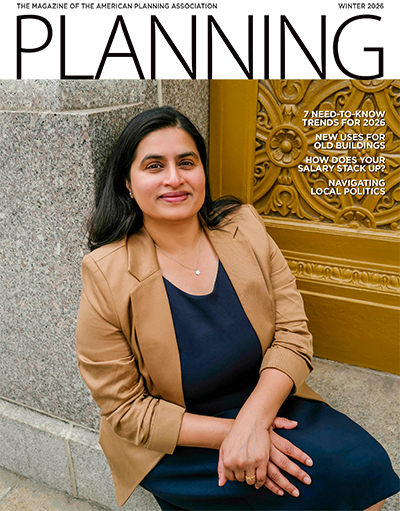Sept. 7, 2023
In the world of urban planning, where decisions shape the lives of countless individuals, the ability to lead with empathy is increasingly important. The ability to respond to other people's emotions appropriately, to feel what another person is feeling, and to understand someone's response to a situation are the building blocks for successful leadership.
Empathy crucial for effective planning
While not a new skill, empathy recently has taken on a greater role in political, professional, and personal life. Forbes research called it "the leadership competency to develop and demonstrate now and in the future of work."
It's also an area that American Planning Association (APA) has identified as an opportunity for planners to upskill themselves. "Planners have an amazing opportunity to approach leadership that's grounded in empathy to create a culture of care focusing on people," said Silvia Vargas, FAICP, LEED AP, principal planner at Calvin, Giordano & Associates at a panel discussion called Leading With Empathy, which was cohosted by APA's Women and Planning Division (WPD) and APA Career Services.
So, how is empathy a leadership competency and how does it help planners do their jobs better? Here are five ways.
1. Understanding Community Needs
By putting themselves in the shoes of community members, planners gain a deeper understanding of their needs, concerns, and aspirations. It allows them to transcend mere statistics and data, acknowledging the human impact of their decisions. Whether it's improving transportation infrastructure, designing public spaces, or addressing housing needs, empathetic planners can create solutions that truly address the underlying issues faced by residents.
2. Engaging the Community
Planners who lead with empathy actively seek out diverse voices and perspectives, ensuring that the planning process is inclusive and representative. They create spaces for true community engagement and dialogue, actively listen to residents' concerns, and incorporate their ideas into the decision-making process. This participatory approach not only leads to better outcomes but also fosters a sense of ownership and pride within the community.
3. Addressing Inequities
Addressing inequities through empathy helps planners recognize the disparities and challenges faced by marginalized communities, so that they can bridge gaps in access to resources, opportunities, and services. By prioritizing equity in their decisions, empathetic planners can create policies and interventions that uplift underserved neighborhoods, reduce disparities, and promote social justice.
4. Collaboration and Partnerships
By building relationships and creating networks of support, empathetic planners can leverage the strengths of different stakeholders and work towards shared objectives and long-term, sustainable goals.
5. Fostering Inclusive Work Environments
Equitable, empathetic employers outpace their competitors by respecting the unique needs, perspectives, and potential of all team members. "Leaders need to be ready for employees who expect authenticity in the workplace" said Chloe Greene, founder of Chloe Greene Consulting, and another panelist in the WPD webinar. "Planners should lead with an abundance mindset to enhance engagement, motivation, and retention — creating a culture that effectively makes the most of diversity."
Empathy in action, she adds, is understanding an employee's struggles and offering to help. It is appreciating another team member's point of view and engaging in a healthy debate that builds a better solution. As an empathetic leader, people may not remember what you say, but they will remember how you made them feel.
Empathy lies at the heart of effective planning. By leading with empathy, as well as recognizing the importance of empathy in urban development, planners can understand the needs of the community, engage residents in decision-making, address inequities, and foster collaboration.




